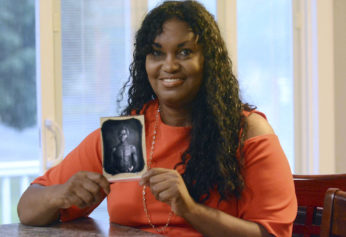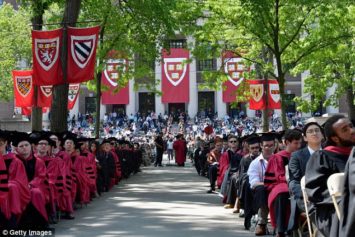
Food service workers march Wednesday on Harvard University’s campus, marking the first strike on the Ivy League campus since 1983. Photo by Steven Porter.
Why can’t the university with the largest endowment in the nation afford to pay its workers decent living wages?
Harvard University and over 700 dining hall workers employed by the institution came to a “tentative agreement” Tuesday after workers staged a three-week-long strike over wages and health benefits, the union representing the employees told The Atlantic.
Brian Lang, president of Unite Here Local 26, confirmed that both parties had finally reached an agreement that acknowledged “all of the concerns.” However, Lang said the strike would go on until a vote could be taken on Wednesday. He gave no additional details about the compromise.
According to the Harvard Crimson, roughly 500 students walked out of classes and rallied in Harvard Yard in an overwhelming show of support for the picketing dining hall workers. Gabe G. Hodgkin, an organizer with the school’s Student Labor Action Movement, said students vowed to occupy the building until Harvard’s negotiating team reached a “fairer resolution” with the union.
“The specifics we can’t get into… but we have a little bit more work to do upstairs right now,” Aaron J. Duckett, a dining hall worker who sat in on the negotiations, told a group of roughly 50 students remaining in the building around 10:30 that night. “I feel like we’re on the right path.”
Workers demanded that the university increase their pay to at least $35,000 per year and maintain current health benefits so as not to raise their already expensive out-of-pocket healthcare costs.
While Harvard has one of the largest endowments of any institution in the United States — $35.7 billion — a worker named Rosa Ines Rivera said she was forced to pass up a doctor’s appointment to get an area on her lung checked for cancer to limit co-pays after a doctor informed her that her daughter might need to undergo surgery, The Atlantic reports.
“Harvard is the richest university in the nation, with a $35 billion endowment,” Rivera, who has worked at the school for 17 years, wrote in an op-ed piece for The New York Times. “But I can’t live on what Harvard pays me. I take home between $430 and $480 a week, and this August, I fell behind on my $1,150 rent and lost my apartment. Now my two kids and I are staying with my mother in public housing, with all four of us sharing a single bedroom.”
“I grew up in the projects and on welfare,” she continued. “I want my 8-year-old daughter and 2-year-old son to climb out of the cycle of poverty. But for most of my time at Harvard it’s been hard.”
Harvard officials contended that workers are paid $22 an hour, which is more than what most food-service workers earn. The university also noted that it requested all union workers, not just the dining hall workers, to shell out more cash for insurance coverage due to the rising costs of health insurance.
Despite these justifications, Harvard students and faculty are seemingly more sympathetic to the cause of university workers.
“Time for the school to show some moral leadership and set an example for the rest of higher ed,” wrote Emil Guillermo, who describes himself as a working-class kid who attended the university on scholarship in the 1970s. “Harvard can do that easily by taking care of the people who never graduate but choose to give their lives to make Harvard work.”
“To meet workers’ demands of $35,000 a year would be peanuts for the $35 billion institution,” he added.
A Harvard Magazine article published last year pointed out that one of the university’s endowments managers raked in more than $11 million in 2013. Harvard’s president also makes close to six figures each year, while hourly-wage workers struggle to earn decent pay.
Final details of the Harvard agreement remain concealed, but workers see it as a giant step in the right direction.
“First and foremost I want to thank the students who have been side by side fighting with us,” dining hall employee Anabela A. Pappas said. “My coworkers and I would not be here without you.”


